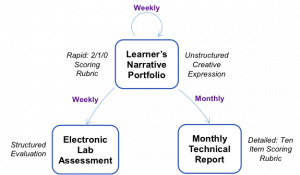Tags: Assessment, Critical Thinking, Engineering, ePortfolio, Laboratory, STEM, Student Centered, Writing
Description
Weekly lab reports are an integral part of the foundational engineering curriculum. In many conventional science, technology, engineering, and mathematics (STEM) curricula, students are required to write a report after each weekly experiment, documenting the lab process. Recent research by Vargas and Hanstedt (2014), however, indicates limitations of weekly lab reports, including reduced effectiveness to evaluate students’ skills gained from the experiment.
In order to address the issues with conventional weekly lab reports, learner portfolio can be used to increase students’ attention toward creativity. This authentic performance-based assessment method assists students by incrementally improving their analytical thinking and composition skills (Vargas and Hanstedt, 2014).
Link to example artifact(s)
Dr. Ronald DeMara transformed the conventional laboratory delivery using learner portfolios followed by electronic assessments in his undergraduate Computer Organization class.
- Each week, students are asked to write a narrative portfolio during the lab session, which is primarily focusing on how they have approached and performed the experiment. It allows their own creative expression regarding how they have completed the tasks that they were asked to perform. Portfolios then will be graded rapidly after with a 2/1/0 scoring rubric in which 2 means sufficient, 1 means insufficient and 0 indicates no submission.
- In the subsequent week, learners complete an online formative assessment, which contains the topics covered during the week. These Electronic Lab Assessments are graded immediately within the Learning Management System (LMS), enabling students to see their score.
- In completing the entire lab experiment, which consists of individual learning elements whereby students compose a technical report based on the capstone experiment, students learn how to compose technical reports. The following figure 1 shows the flow of the lab assessment.
Outcomes
In the Fall 2015 semester, the instructor piloted the new lab assessments. Compared to previous semesters, there were 30% and 12% increases in As and Bs, respectively as well as 18% and 22% decreases in Cs and Ds, respectively in the final grade. Student survey results indicated that the majority of the students strongly prefer laboratory procedures and assessments structured with the new approach, as compared to the conventional approach of laboratory delivery. Evidence showed that benefits of the restructured lab include the reduction of voluminous lab reports often deficient due to unimaginative and reused content, motivating learners to engage in professional document authoring through creative expression of a student-structured portfolio, and focusing learner’s attention on laboratory procedures likely to appear in the subsequent week’s formative assessment.
Link to scholarly reference(s)
DeMara, R., Salehi, S., Khoshavi, N., Hartshorne, R., & Chen, B. (2016). Strengthening STEM laboratory assessment using student-narrative portfolios interwoven with online evaluation. Proceeding from 2016 ASEE: The American Society for Engineering Education Southeast Section Conference. Tuscaloosa, AL. March 13-15.
Vargas, S. K., & Hanstedt, P. (2014). Exploring alternatives in the teaching of lab report writing: Deepening student learning through a portfolio approach. Double Helix: A Journal of Critical Thinking and Writing. 2.
Citation
DeMara, R., Salehi, S., Khoshavi, N., Hartshorne, R., & Chen, B. (2016). Strengthening stem laboratory assessment using learner portfolio and electronic assessment. In B. Chen & K. Thompson (Eds.), Teaching Online Pedagogical Repository. Orlando, FL: University of Central Florida Center for Distributed Learning. https://topr.online.ucf.edu/strengthening-stem-laboratory-assessment-using-learner-portfolio-and-electronic-assessment/.Post Revisions:
- August 6, 2020 @ 18:40:20 [Current Revision]
- August 6, 2020 @ 18:40:20
- March 29, 2018 @ 19:15:18
- March 9, 2018 @ 19:42:24
- March 2, 2018 @ 17:46:32


